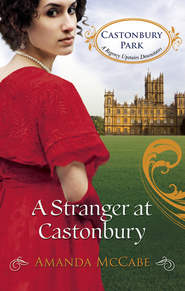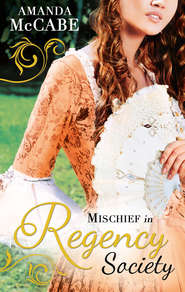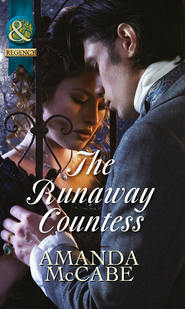По всем вопросам обращайтесь на: info@litportal.ru
(©) 2003-2025.
✖
A Notorious Woman
Настройки чтения
Размер шрифта
Высота строк
Поля
Not yet, but soon. Soon, this serene city would lie on its back for him and splay her jewelled legs like a two-scudi whore, and it would give up to him all he desired, all he demanded. All he had planned and worked for since he was a child.
And God help anyone who got in his way. Even a woman with night-dark hair and white skin scented with flowers and sadness.
Marc tossed back a long swig of the rough, cheap ale. “No villa or farm seems worth the fuss Ermano is making. One would think he had enough of those already.”
“Perhaps the exalted count knows he is being made a laughingstock by his determined, and very public, pursuit of the widow Bassano,” Nicolai said, his voice touched only at the very edges by the sound of his long-abandoned Russian homeland. “And it has made him more determined.”
Marc remembered Julietta Bassano’s eyes, as dark as black ice and twice as perilous. “I am sure that is true.”
Nicolai took a long sip of the ale, his gaze constantly scanning the dim tavern. “What is your next step, my friend?”
“Why, to woo the beautiful signora, of course,” Marc answered, with a humorless laugh. “She is the key to this entire affair.”
“And with the freedom of Carnival upon us, who knows what will happen?”
“Exactly.”
“Just take care, Marc, I beg of you.”
Nicolai’s tone, always so full of cynical merriment, was suddenly quiet and solemn. Marc tossed him a puzzled glance over the rim of his goblet. “I always do. How else could I survive the life of seafaring mercenary?”
Nicolai shook his head. “Ermano is well known for his treachery, even in a city as perilous and deceptive as Venice.”
Marc had a quick, flashing memory, an image of golden hair spread across a marble floor, sightless blue eyes, a gaping red wound on a white throat. “Well, I know it.”
“Yet you are still willing to bargain with the devil?”
Marc swallowed down the bitter dregs of the ale. “I must. I have come a long way to see this through, Nicolai. There were vows made, and I must fulfill them. It has been far too long.”
“As I thought. You have always been a stubborn mule, ever since I met you in that filthy brothel in Germany.”
Marc laughed. “But you needn’t be a part of it any longer. I have no wish to be the ruin of the few friends I possess. It is my quarrel alone, after all.” Even as he said the words, though, Marc knew he could not lose Nicolai’s help; knew he had to keep it by any means possible. Nicolai had saved his life in that brothel, and Marc had saved his in return, threefold. He needed his friend at his back now, when it mattered more than ever.
Nicolai grinned, back to his merry Arlechino self. “And what else would I do to amuse myself in these dull days? The troupe does not move on to Mantua until after Carnival and Lent, when merriment will be wanted again. Until then, my meagre skills are at your disposal, Il leone.” Something swift and dark flashed deep in Nicolai’s eyes, quickly veiled by another laugh. “I doubt most of Venice would agree it is your quarrel alone, though. I think they would beg leave to share it.”
Before Marc could question him, the tavern door opened, admitting a rush of cold air and pale sunlight—and Julietta Bassano’s maidservant. The girl strolled over to the counter, her striped skirts and fringed shawl swaying.
“Signora Bassano’s maid,” Marc muttered. “I believe her name is Bianca.”
“Ah.” Nicolai nodded sagely. “A lady’s greatest confidante is often her maid. And this one just seems full of—knowledge.” Without another word, Nicolai slid out from behind the table and crossed the room to Bianca’s side. In no time at all, flirtatious giggles echoed through the dusty air, like unfurled streamers of bright ribbon.
Marc dropped a few coins beside the empty goblets and took his own leave. Nicolai would be occupied for quite a while to come.
Outside the tavern the day was cold, but the early morning fog had burned away leaving pale, yellow-gray sunlight to light up the dark waters and pastel houses. Marc drew his short cape closer about him and melted into the crowds hurrying along the fondamento. With his cap pulled low, no one recognised him as Il leone and he was free to wander where he would.
Strangely, his feet desired nothing more than to return to Julietta Bassano’s blue door. To lose himself amid the sweet, soft scents of her shop, to watch the tall, elegant lady as she moved behind the counter, proffering up violets on her fair skin. She was truly a glorious mystery, one he looked forward to unravelling one silken skein at a time.
But not yet. Even as he half turned towards her campi, he knew it was far too soon. He told her he would return in two days; two days for her to think of him, for her wary intrigue to deepen into the first blooming of need and desire. Two days for him to think of her, as well, to think of all he longed to obtain from her. Two very long days.
In the meantime, he had important work to do. He stepped forward to summon a passing gondola.
Julietta sat straight up in bed, gasping for air. Her skin felt cold, icy cold, despite the fire still smouldering in the grate and the thick coverlets piled atop her. She shivered and ran her hands over her face, shaking her head hard to rid it of the mist of dreams. It didn’t work—she still felt as if someone was watching her, staring into her very soul until all her secrets lay bare.
She leaned over to light the candle on the bedside table, casting a flickering red-orange glow into every corner of the small chamber. There were no soulsnatching demons there, of course; she was alone, as always. Only stacks of books on every table and chair, a few pieces of clothing strewn about in black-and-white streamers, a half-drunk glass of wine.
“Just a dream,” she whispered. Not even a dream she could remember. Only bright, flashing fragments of movement and colour remained. And a pair of searing turquoise-blue eyes.
Julietta tossed back the bedclothes and swung her legs to the floor, wincing as her bare feet touched the cold wooden planks. Her fur-trimmed dressing gown was tossed at the foot of the bed, but she ignored it, crossing over to the window in only her thin linen chemise. The cold was good. It shocked her into a waking reality where no dreams could touch her.
The moon, a glistening, silvery-yellow crescent, hung high in the glossy black sky. ’Twas hours until daylight, then. Hours until sunlight and work could distract her. Everything always seemed closer, more suffocating in the night. The past, the future, all inescapable.
But Venice belonged to the mysteries of night, to darkness and deep waters and shadowed doorways that promised so much. It made the night so tempting, ever beckoning her forth from the careful construction of her safe lies. “Come to us,” the waters whispered. “Come to us, belong to us, as you know you do, and we will show you delights you could not even dream of. We will give you all you desire, all you seek, if you will just surrender.”
Surrender. The one thing she could never do. Julietta Bassano was born to stand solitary, to fight always against who she was, who she feared to be. Yet on nights like this one…
On nights like this, Eros and Thanatos, love and death, entwined in the narrow calli of the city, and she had such sharp, sweet longings. She loved Venice, because she and the city were one in the night, neither of them ever what they seemed to be.
Julietta leaned her forehead against the cool glass of the window, watching the deserted campi below and remembering the man who had visited her shop that morning. Il leone. Marc Antonio Velazquez. By whatever name he went, he was dangerous. She knew that the instant he touched her hand, and her flesh came alive at the stroke of his.
Shrugging the heavy braid of her hair back from her shoulder, Julietta reached out to push open the window. She closed her eyes as the cold night air washed over her face and throat, along the curve of her breasts bared by the low neck of the chemise and, for one moment, she imagined it was his hand on her skin. His callused sailor’s touch sliding roughly over her shoulder, tracing a crooked line of fire lower, ever lower, his breath cool and sweet, making her shiver in sweet anticipation…
Madre de dio! Julietta’s eyes flew open, and she found herself alone, staring down at the emptiness of the campi. From a distance, echoing, she heard laughter and music from some merry gathering, but no turquoise-eyed sorcerer watched her. No caresses reached out for her.
Dangerous, indeed. Once, long ago, when she was young and foolish, she had thought her husband handsome and charming, had fancied herself in love with him like a maiden and a knight in a poem. She had craved his kisses, worshipped his voice and touch and glance. That had shattered in an unfathomable rush of hellish violence that killed the girl she had been for ever.
After Giovanni died and she came to start a new life in Venice, Julietta took a couple of lovers, gentle, unassuming, discreet men whose kisses were pleasant and sweet, but did not move her to the dizzying heights she felt when first with Giovanni. Neither did they ever cast her into black despair.
Marc Antonio Velazquez could do that. She sensed it, knew it. There was something hidden about him, concealed behind his good looks and fine clothes, his polished manners. Only one cloaked soul could recognise another. He was a complication she did not need. Her life was good now. Settled. Safe.
As safe as she could ever make it.
Men such as Il leone had no place in her world. She had to make sure of that.
Julietta shut the window and latched it before taking up her dressing gown. As she slipped it over her chemise, she left her chamber on careful, silent feet. Bianca snored softly on her truckle bed in the corridor, but Julietta just crept past her, down the narrow stairs to the darkened shop. The shutters were drawn tightly over the windows, the door solidly locked and barred; no one could possibly be spying on her here. Still, she glanced carefully over every inch of the room, every vial and jar, before creeping over to the hidden panel set in the wall.
Her fingertips quickly found the tiny knot of wood and pressed hard. The panels slid apart to form a fissure just large enough for her to move through. She lit a branch of candles before shutting the secret door behind her again, closing herself into her own private world.
There were no windows or skylights in her hideyhole; the only light came from the soft flicker of the candles. It was a small chamber, yet held all she could need. Long, narrow tables were pushed against two of the walls, laden with scales, beakers, silver bowls, a mortar and pestle and a variety of spoons and knives. The other two walls held shelves piled with books: ancient volumes she had painstakingly and at great expense collected over the past three years or had inherited from her mother and grandmother. There were also several covered baskets and pottery bowls, rows of stoppered bottles. Suspended from the dark wood rafters were bunches of dried herbs along with other, stranger materials. Ones she would never want the patrons of the perfumery just beyond the wall to see.
Never.
Julietta quickly went to work, for the night was half gone already. She spread out her materials—a beaker filled with clear liquid, small scissors, the mortar and pestle—and lit a small bowl of oil. Narrowing her eyes, she gazed up at the herbs, gauging which ones suited her purposes tonight. Angelica, yes; nettle, rue, and marjoram—all of them held great powers of protection and wisdom. Using the little silver scissors, she snipped a sprig from each and put them in the silver bowl.
Her herbs gathered, she knelt beside the table, hands tightly clasped and eyes shut. “Oh, Great One,” she whispered. “I pray that the mysteries will be revealed to me this night, and my place in the world restored. Help me to see the truth. Guide me in my actions. Protect me.”
And help me to divine what this Signor Velazquez seeks here in Venice, she added silently.
“Amen.” Julietta crossed herself, and stood up to reach for the herbs she had chosen, the mortar and pestle. These hours, deep in the secret cloak of night, belonged only to her, to the lessons she had learned so long ago from her poor mother, from her grandmother. They had to belong only to her—or they could mean her very death.











